Report: Integrated Marketing Communication Strategy for CBA Analysis
VerifiedAdded on 2023/06/05
|13
|1483
|140
Report
AI Summary
This report provides an in-depth analysis of the Integrated Marketing Communication (IMC) strategy employed by the Commonwealth Bank of Australia (CBA). It begins with an introduction to the concept of IMC and its importance for organizational sustainability. The report then delves into an analysis of both the internal and external environments of CBA, including brand image, promotions, and the strengths and weaknesses of the brand. A significant portion of the report is dedicated to the analysis of CBA's target market, segmenting customers based on value and outlining strategies for engagement and retention. The report details the communication strategy, including specific, measurable, attainable, relevant, and time-bound (SMART) objectives, along with creative strategies such as advertisements, referral programs, and community outreach. A budget chart is included, outlining research, communications, networking, and promotional costs. The conclusion summarizes the key findings, and recommendations are provided, such as using smart objectives, the Ad Stack model, and effective promotional activities. The report is supported by an extensive list of references, demonstrating a thorough understanding of the subject matter.
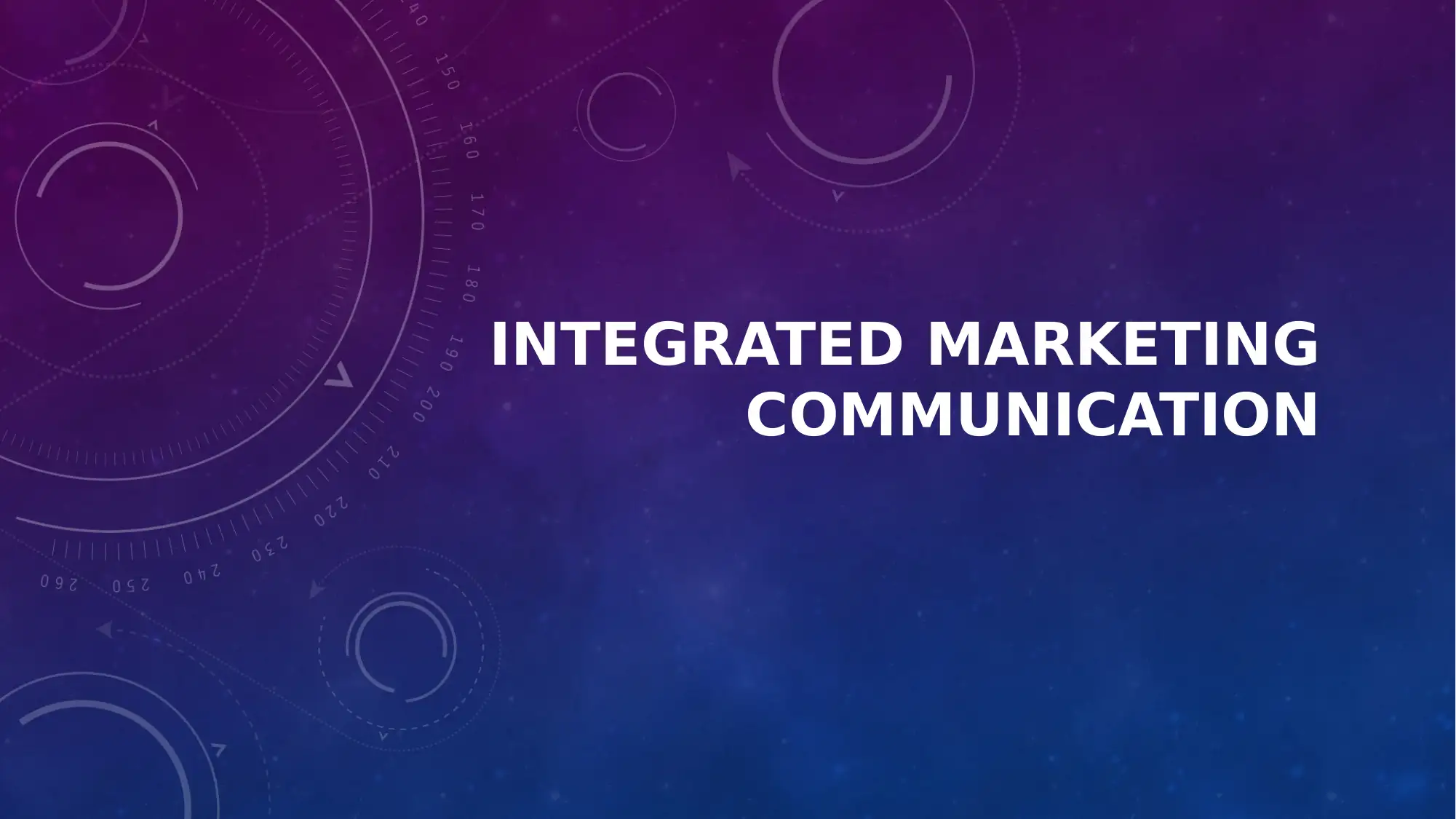
INTEGRATED MARKETING
COMMUNICATION
COMMUNICATION
Paraphrase This Document
Need a fresh take? Get an instant paraphrase of this document with our AI Paraphraser
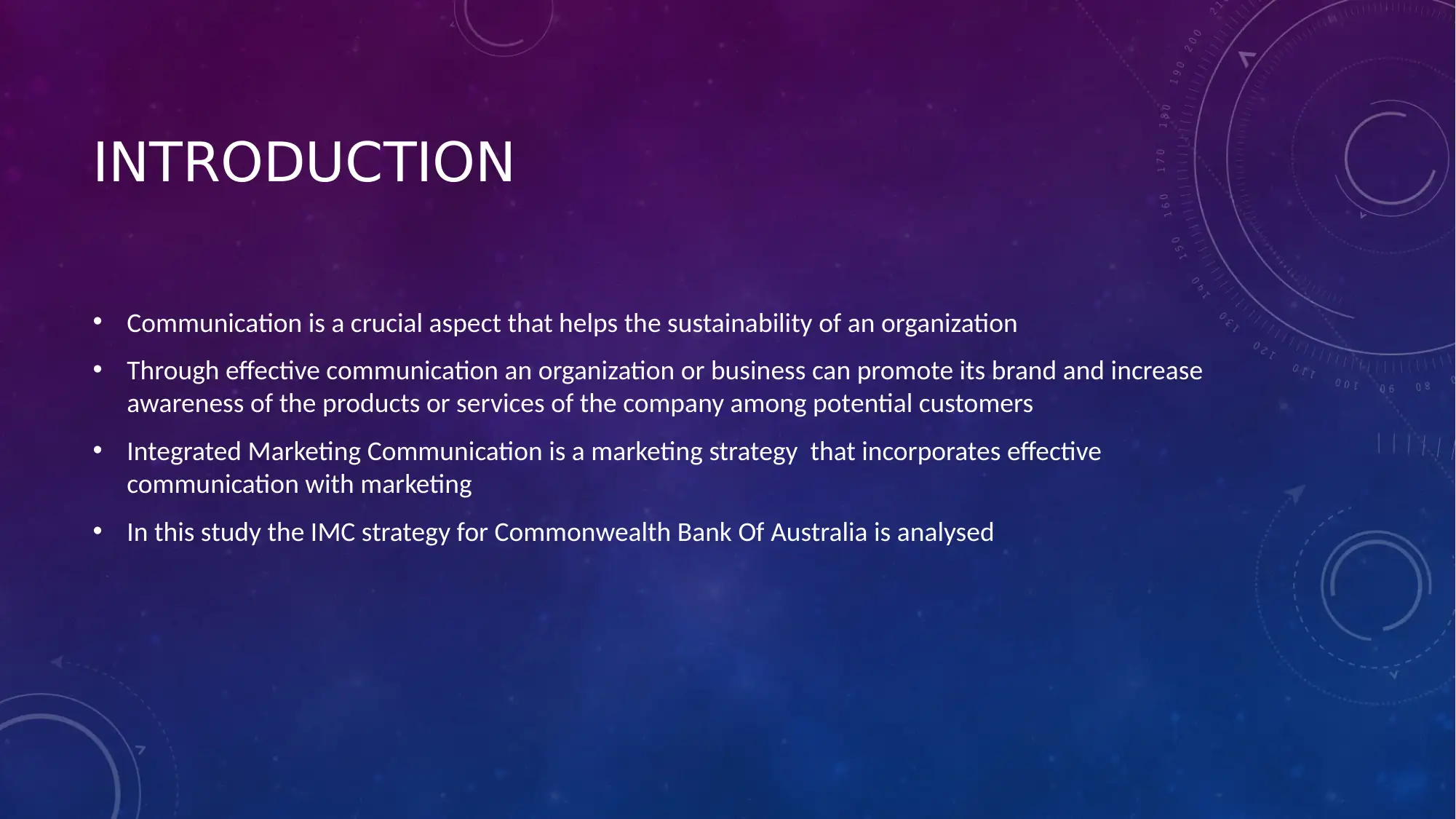
INTRODUCTION
• Communication is a crucial aspect that helps the sustainability of an organization
• Through effective communication an organization or business can promote its brand and increase
awareness of the products or services of the company among potential customers
• Integrated Marketing Communication is a marketing strategy that incorporates effective
communication with marketing
• In this study the IMC strategy for Commonwealth Bank Of Australia is analysed
• Communication is a crucial aspect that helps the sustainability of an organization
• Through effective communication an organization or business can promote its brand and increase
awareness of the products or services of the company among potential customers
• Integrated Marketing Communication is a marketing strategy that incorporates effective
communication with marketing
• In this study the IMC strategy for Commonwealth Bank Of Australia is analysed
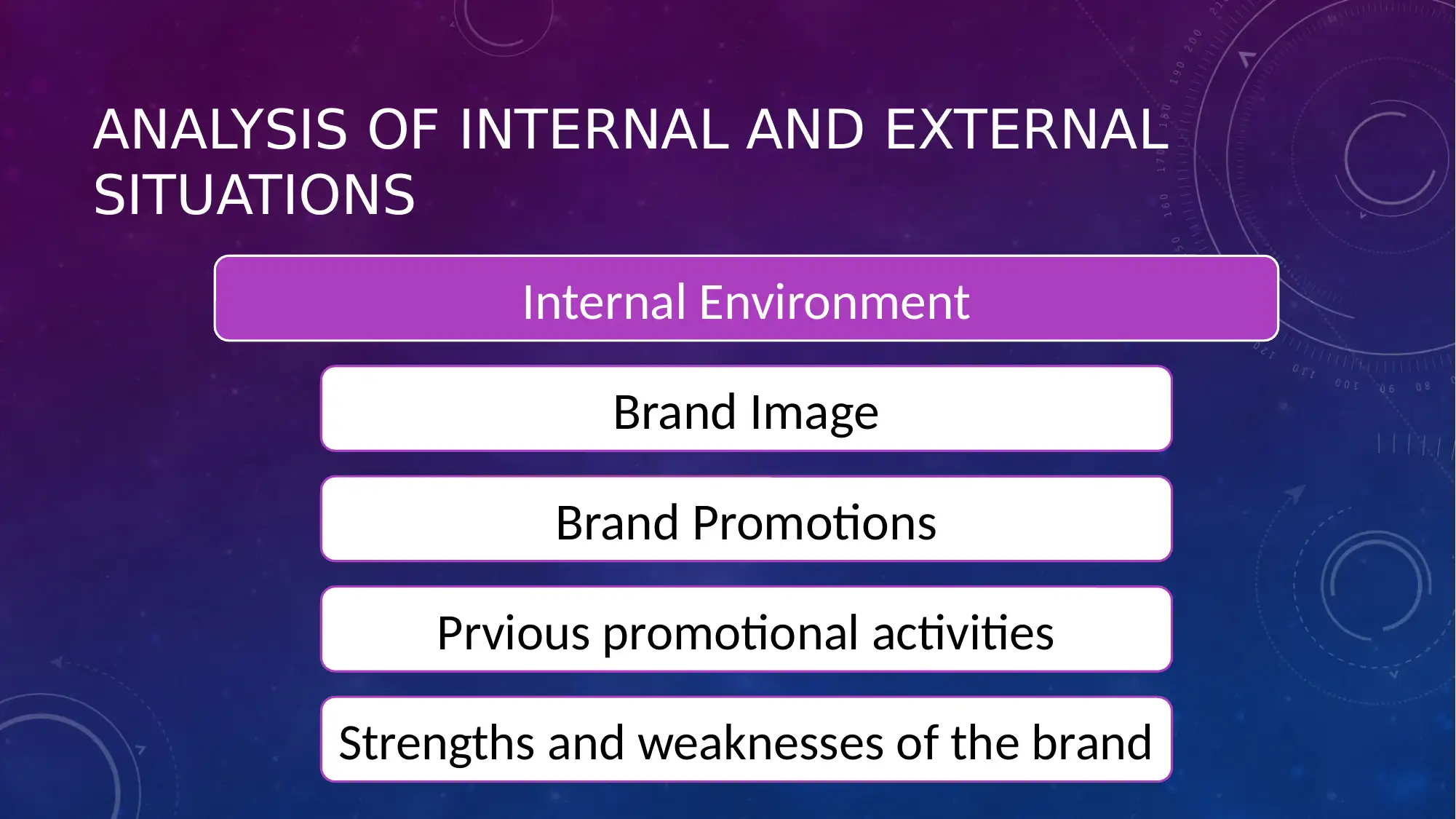
ANALYSIS OF INTERNAL AND EXTERNAL
SITUATIONS
Internal Environment
Brand Image
Brand Promotions
Prvious promotional activities
Strengths and weaknesses of the brand
SITUATIONS
Internal Environment
Brand Image
Brand Promotions
Prvious promotional activities
Strengths and weaknesses of the brand
⊘ This is a preview!⊘
Do you want full access?
Subscribe today to unlock all pages.

Trusted by 1+ million students worldwide
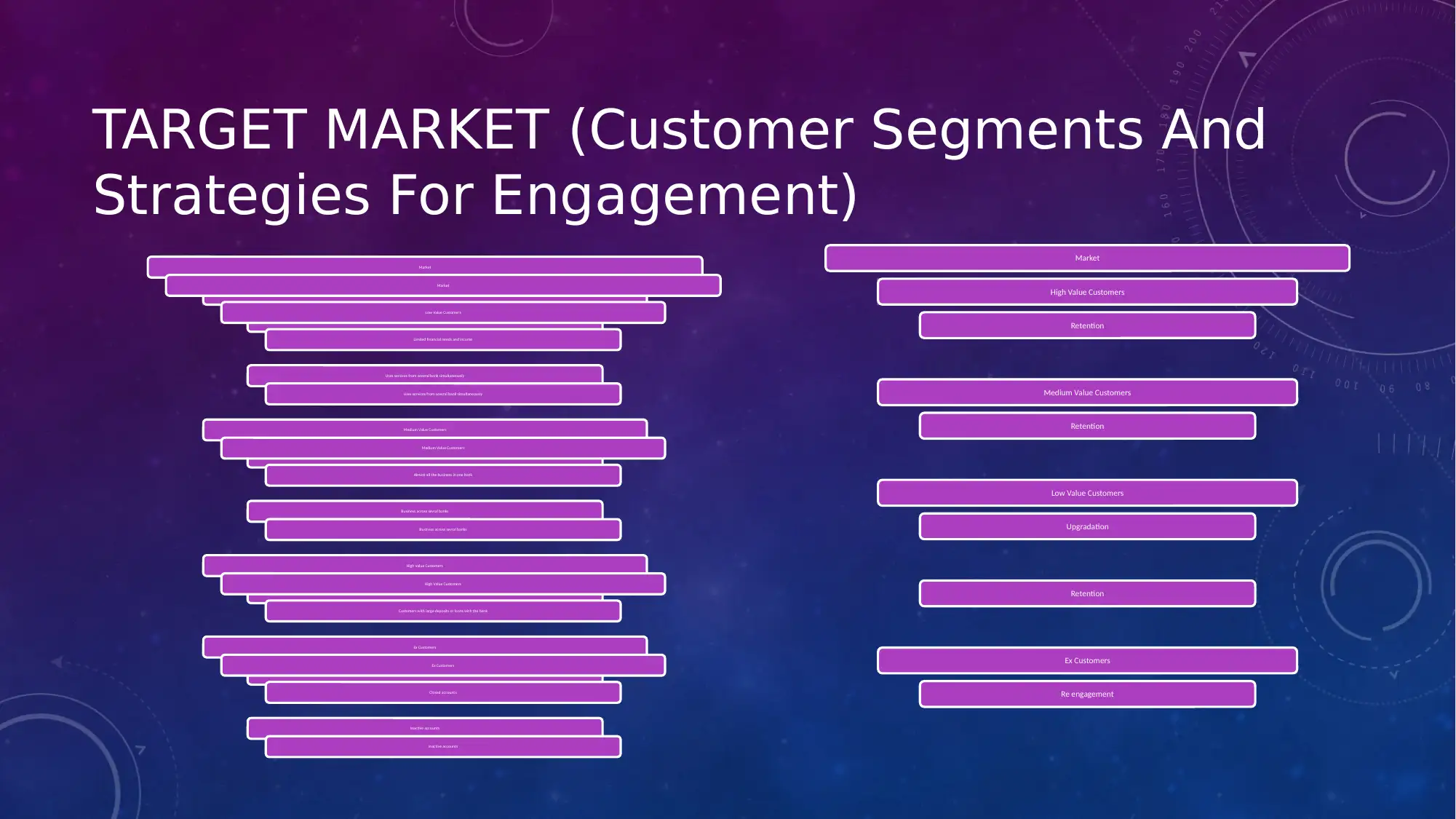
TARGET MARKET (Customer Segments And
Strategies For Engagement)
Market
Low Value Customers
Limited financial needs and income
Uses services from several bank simultaneously
Medium Value Customers
Almost all the business in one bank
Business across sevral banks
High Value Customers
Customers with large deposits or loans with the bank
Ex Customers
Closed accounts
Inactive accounts
Market
High Value Customers
Retention
Medium Value Customers
Retention
Low Value Customers
Upgradation
Retention
Ex Customers
Re engagement
Market
Low Value Customers
Limited financial needs and income
Uses services from several bank simultaneously
Medium Value Customers
Almost all the business in one bank
Business across sevral banks
High Value Customers
Customers with large deposits or loans with the bank
Ex Customers
Closed accounts
Inactive accounts
Strategies For Engagement)
Market
Low Value Customers
Limited financial needs and income
Uses services from several bank simultaneously
Medium Value Customers
Almost all the business in one bank
Business across sevral banks
High Value Customers
Customers with large deposits or loans with the bank
Ex Customers
Closed accounts
Inactive accounts
Market
High Value Customers
Retention
Medium Value Customers
Retention
Low Value Customers
Upgradation
Retention
Ex Customers
Re engagement
Market
Low Value Customers
Limited financial needs and income
Uses services from several bank simultaneously
Medium Value Customers
Almost all the business in one bank
Business across sevral banks
High Value Customers
Customers with large deposits or loans with the bank
Ex Customers
Closed accounts
Inactive accounts
Paraphrase This Document
Need a fresh take? Get an instant paraphrase of this document with our AI Paraphraser
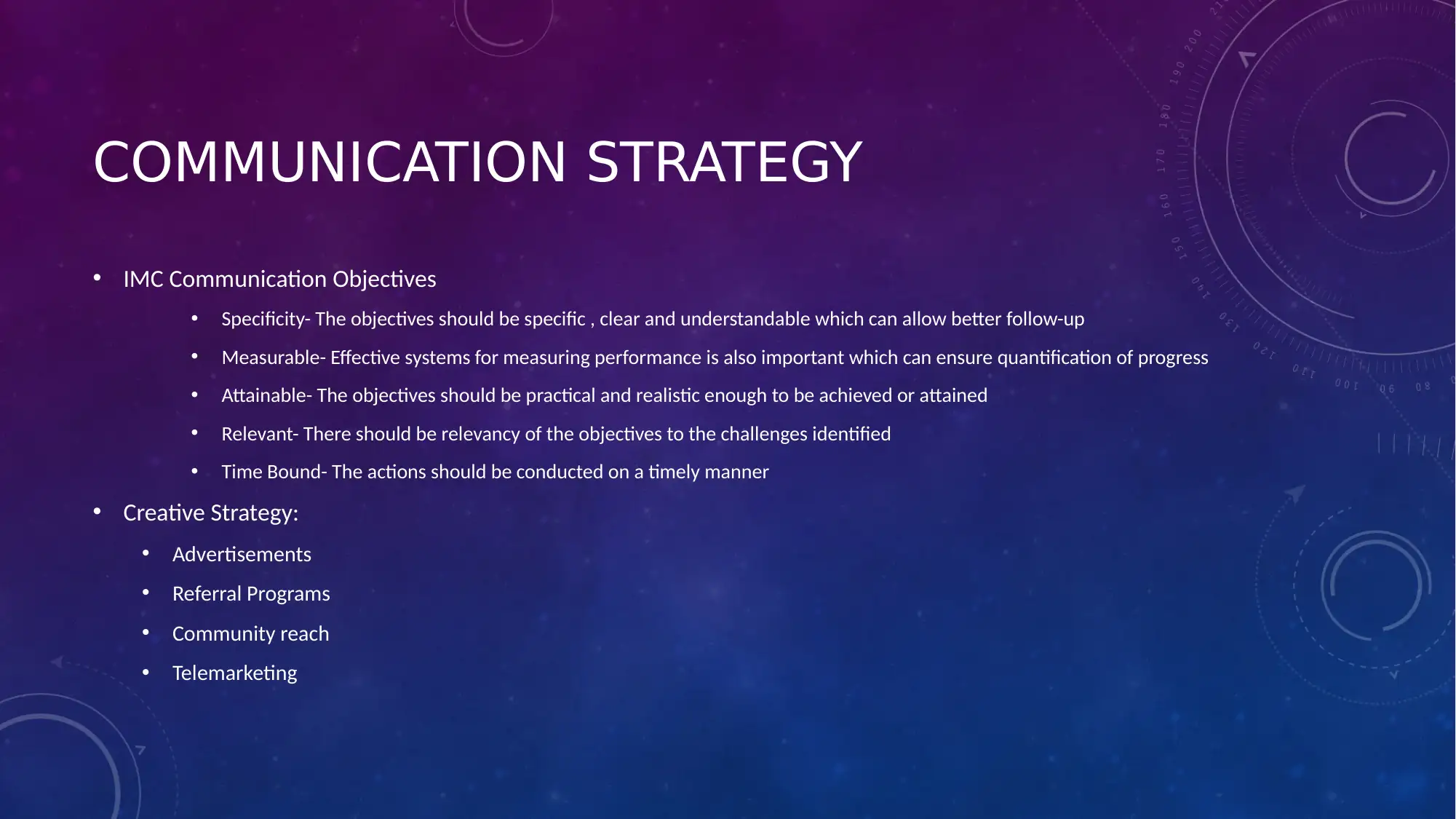
COMMUNICATION STRATEGY
• IMC Communication Objectives
• Specificity- The objectives should be specific , clear and understandable which can allow better follow-up
• Measurable- Effective systems for measuring performance is also important which can ensure quantification of progress
• Attainable- The objectives should be practical and realistic enough to be achieved or attained
• Relevant- There should be relevancy of the objectives to the challenges identified
• Time Bound- The actions should be conducted on a timely manner
• Creative Strategy:
• Advertisements
• Referral Programs
• Community reach
• Telemarketing
• IMC Communication Objectives
• Specificity- The objectives should be specific , clear and understandable which can allow better follow-up
• Measurable- Effective systems for measuring performance is also important which can ensure quantification of progress
• Attainable- The objectives should be practical and realistic enough to be achieved or attained
• Relevant- There should be relevancy of the objectives to the challenges identified
• Time Bound- The actions should be conducted on a timely manner
• Creative Strategy:
• Advertisements
• Referral Programs
• Community reach
• Telemarketing
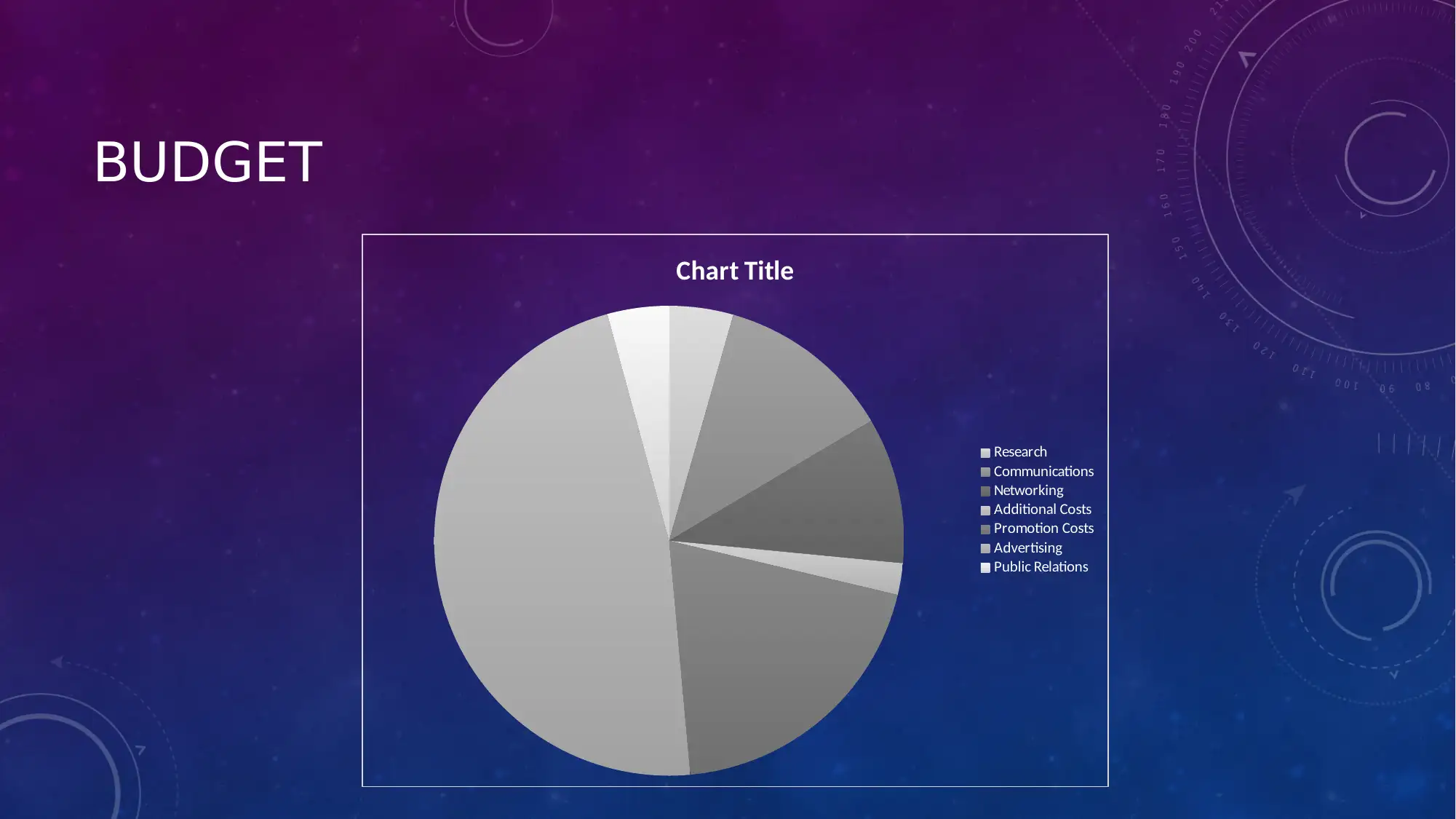
BUDGET
Chart Title
Research
Communications
Networking
Additional Costs
Promotion Costs
Advertising
Public Relations
Chart Title
Research
Communications
Networking
Additional Costs
Promotion Costs
Advertising
Public Relations
⊘ This is a preview!⊘
Do you want full access?
Subscribe today to unlock all pages.

Trusted by 1+ million students worldwide
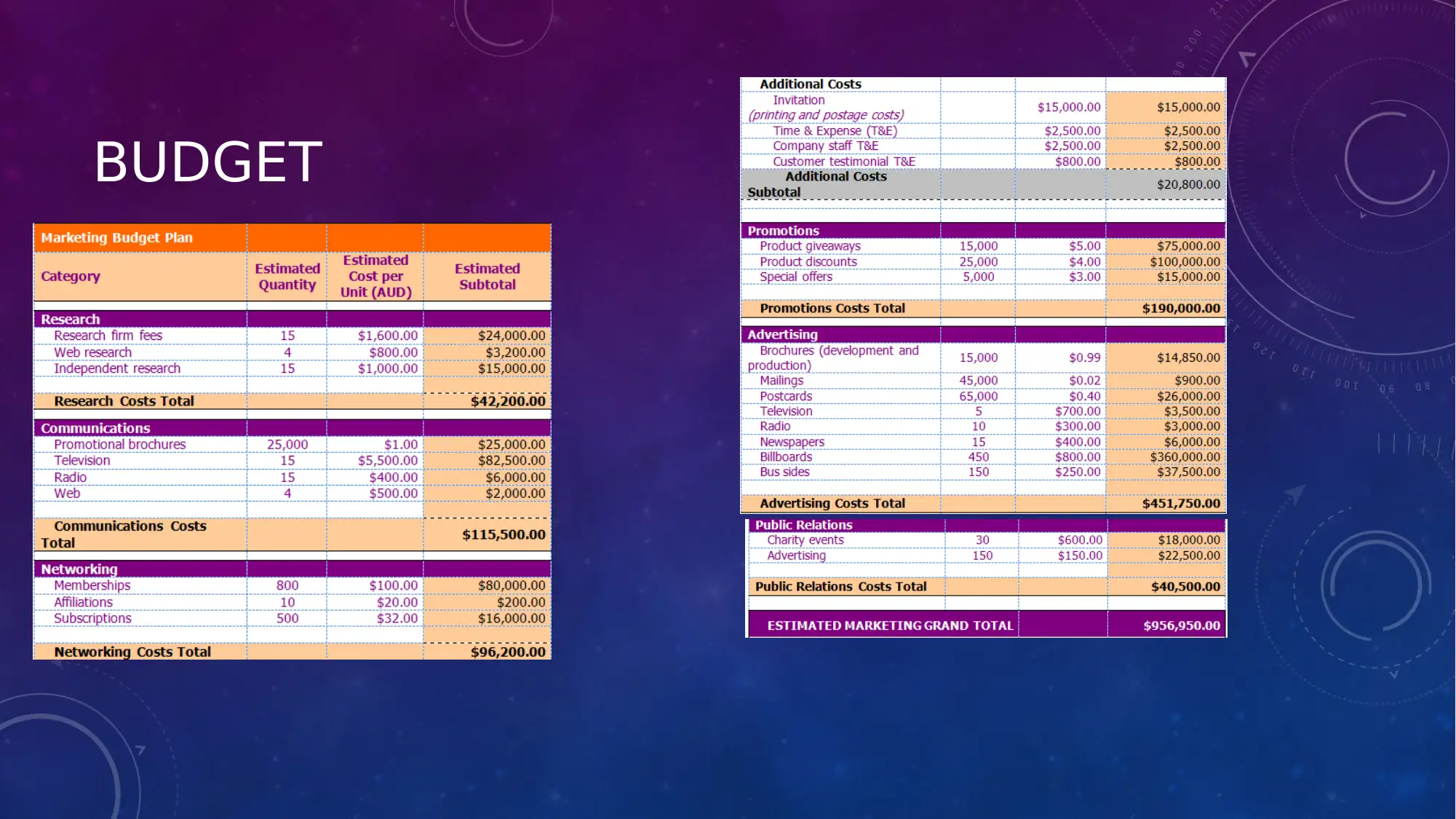
BUDGET
Paraphrase This Document
Need a fresh take? Get an instant paraphrase of this document with our AI Paraphraser
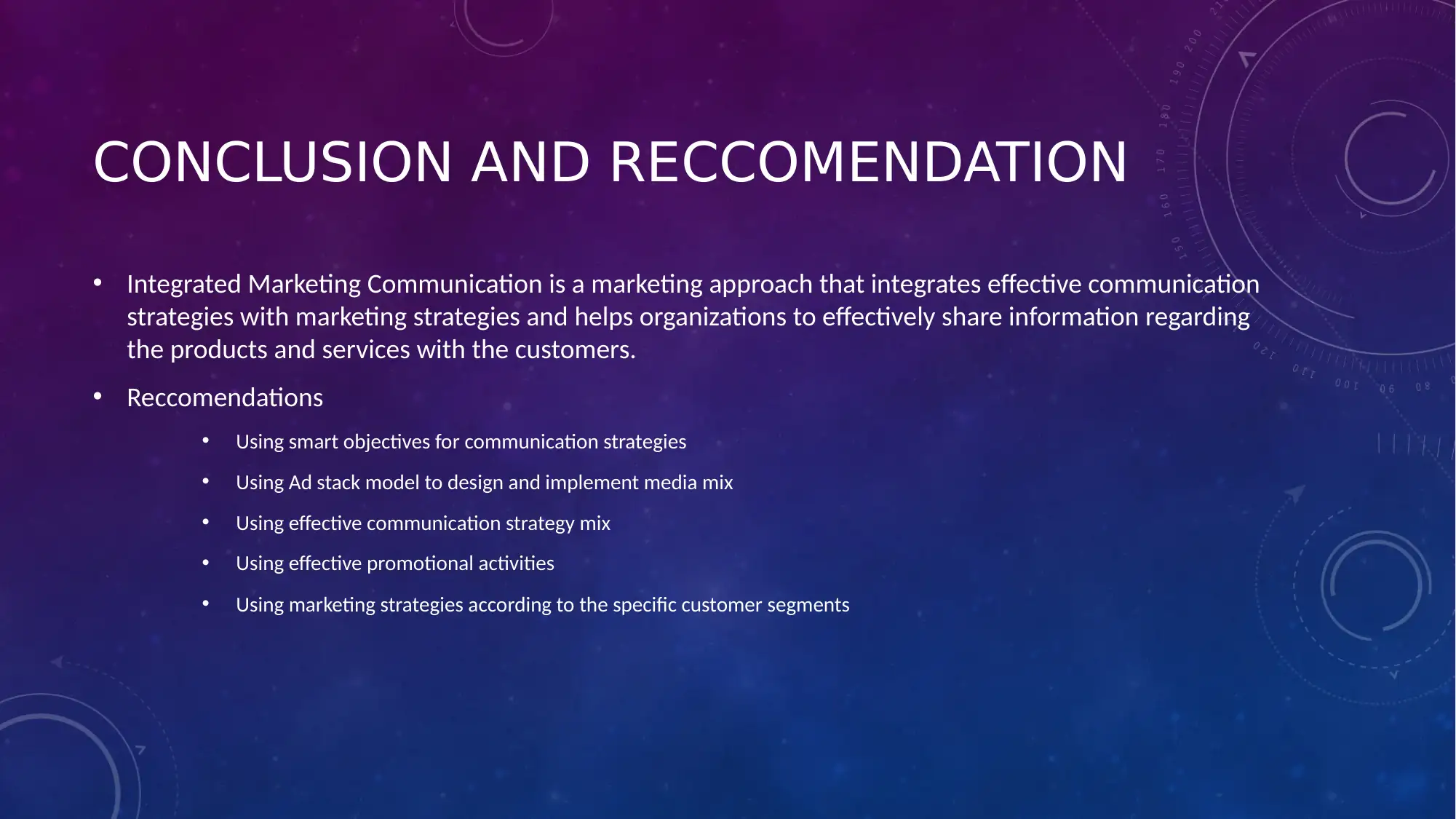
CONCLUSION AND RECCOMENDATION
• Integrated Marketing Communication is a marketing approach that integrates effective communication
strategies with marketing strategies and helps organizations to effectively share information regarding
the products and services with the customers.
• Reccomendations
• Using smart objectives for communication strategies
• Using Ad stack model to design and implement media mix
• Using effective communication strategy mix
• Using effective promotional activities
• Using marketing strategies according to the specific customer segments
• Integrated Marketing Communication is a marketing approach that integrates effective communication
strategies with marketing strategies and helps organizations to effectively share information regarding
the products and services with the customers.
• Reccomendations
• Using smart objectives for communication strategies
• Using Ad stack model to design and implement media mix
• Using effective communication strategy mix
• Using effective promotional activities
• Using marketing strategies according to the specific customer segments
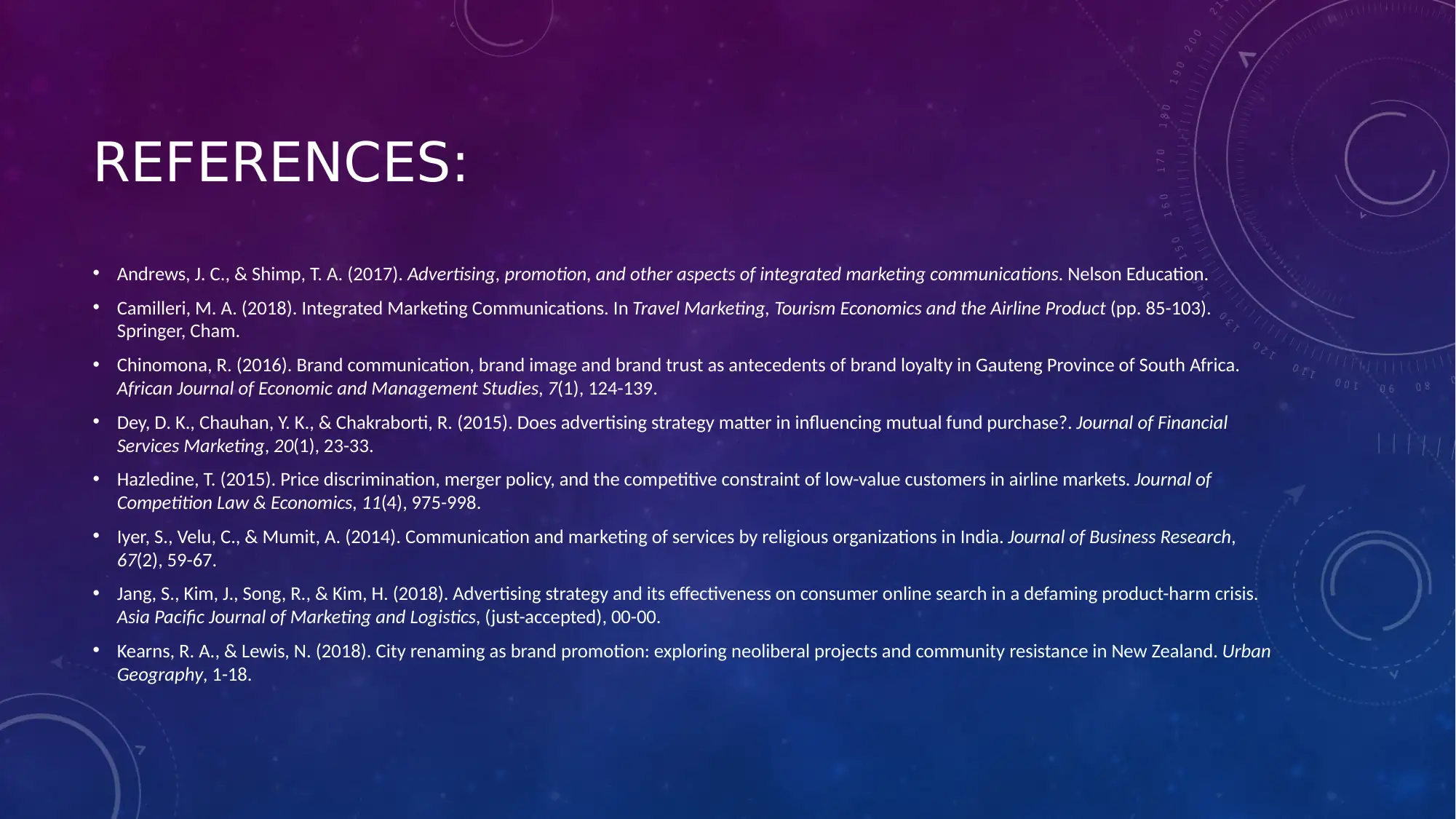
REFERENCES:
• Andrews, J. C., & Shimp, T. A. (2017). Advertising, promotion, and other aspects of integrated marketing communications. Nelson Education.
• Camilleri, M. A. (2018). Integrated Marketing Communications. In Travel Marketing, Tourism Economics and the Airline Product (pp. 85-103).
Springer, Cham.
• Chinomona, R. (2016). Brand communication, brand image and brand trust as antecedents of brand loyalty in Gauteng Province of South Africa.
African Journal of Economic and Management Studies, 7(1), 124-139.
• Dey, D. K., Chauhan, Y. K., & Chakraborti, R. (2015). Does advertising strategy matter in influencing mutual fund purchase?. Journal of Financial
Services Marketing, 20(1), 23-33.
• Hazledine, T. (2015). Price discrimination, merger policy, and the competitive constraint of low-value customers in airline markets. Journal of
Competition Law & Economics, 11(4), 975-998.
• Iyer, S., Velu, C., & Mumit, A. (2014). Communication and marketing of services by religious organizations in India. Journal of Business Research,
67(2), 59-67.
• Jang, S., Kim, J., Song, R., & Kim, H. (2018). Advertising strategy and its effectiveness on consumer online search in a defaming product-harm crisis.
Asia Pacific Journal of Marketing and Logistics, (just-accepted), 00-00.
• Kearns, R. A., & Lewis, N. (2018). City renaming as brand promotion: exploring neoliberal projects and community resistance in New Zealand. Urban
Geography, 1-18.
• Andrews, J. C., & Shimp, T. A. (2017). Advertising, promotion, and other aspects of integrated marketing communications. Nelson Education.
• Camilleri, M. A. (2018). Integrated Marketing Communications. In Travel Marketing, Tourism Economics and the Airline Product (pp. 85-103).
Springer, Cham.
• Chinomona, R. (2016). Brand communication, brand image and brand trust as antecedents of brand loyalty in Gauteng Province of South Africa.
African Journal of Economic and Management Studies, 7(1), 124-139.
• Dey, D. K., Chauhan, Y. K., & Chakraborti, R. (2015). Does advertising strategy matter in influencing mutual fund purchase?. Journal of Financial
Services Marketing, 20(1), 23-33.
• Hazledine, T. (2015). Price discrimination, merger policy, and the competitive constraint of low-value customers in airline markets. Journal of
Competition Law & Economics, 11(4), 975-998.
• Iyer, S., Velu, C., & Mumit, A. (2014). Communication and marketing of services by religious organizations in India. Journal of Business Research,
67(2), 59-67.
• Jang, S., Kim, J., Song, R., & Kim, H. (2018). Advertising strategy and its effectiveness on consumer online search in a defaming product-harm crisis.
Asia Pacific Journal of Marketing and Logistics, (just-accepted), 00-00.
• Kearns, R. A., & Lewis, N. (2018). City renaming as brand promotion: exploring neoliberal projects and community resistance in New Zealand. Urban
Geography, 1-18.
⊘ This is a preview!⊘
Do you want full access?
Subscribe today to unlock all pages.

Trusted by 1+ million students worldwide
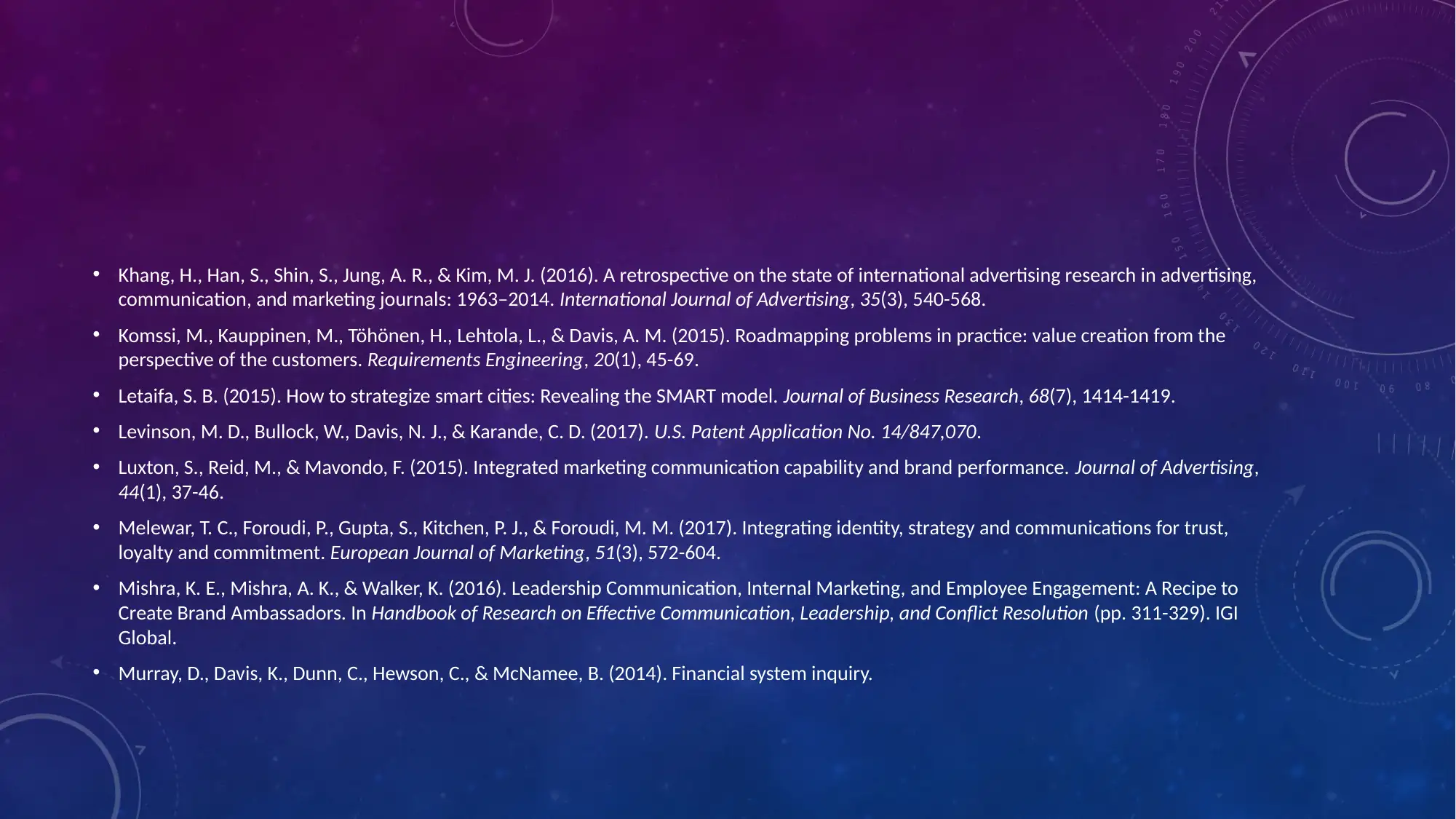
• Khang, H., Han, S., Shin, S., Jung, A. R., & Kim, M. J. (2016). A retrospective on the state of international advertising research in advertising,
communication, and marketing journals: 1963–2014. International Journal of Advertising, 35(3), 540-568.
• Komssi, M., Kauppinen, M., Töhönen, H., Lehtola, L., & Davis, A. M. (2015). Roadmapping problems in practice: value creation from the
perspective of the customers. Requirements Engineering, 20(1), 45-69.
• Letaifa, S. B. (2015). How to strategize smart cities: Revealing the SMART model. Journal of Business Research, 68(7), 1414-1419.
• Levinson, M. D., Bullock, W., Davis, N. J., & Karande, C. D. (2017). U.S. Patent Application No. 14/847,070.
• Luxton, S., Reid, M., & Mavondo, F. (2015). Integrated marketing communication capability and brand performance. Journal of Advertising,
44(1), 37-46.
• Melewar, T. C., Foroudi, P., Gupta, S., Kitchen, P. J., & Foroudi, M. M. (2017). Integrating identity, strategy and communications for trust,
loyalty and commitment. European Journal of Marketing, 51(3), 572-604.
• Mishra, K. E., Mishra, A. K., & Walker, K. (2016). Leadership Communication, Internal Marketing, and Employee Engagement: A Recipe to
Create Brand Ambassadors. In Handbook of Research on Effective Communication, Leadership, and Conflict Resolution (pp. 311-329). IGI
Global.
• Murray, D., Davis, K., Dunn, C., Hewson, C., & McNamee, B. (2014). Financial system inquiry.
communication, and marketing journals: 1963–2014. International Journal of Advertising, 35(3), 540-568.
• Komssi, M., Kauppinen, M., Töhönen, H., Lehtola, L., & Davis, A. M. (2015). Roadmapping problems in practice: value creation from the
perspective of the customers. Requirements Engineering, 20(1), 45-69.
• Letaifa, S. B. (2015). How to strategize smart cities: Revealing the SMART model. Journal of Business Research, 68(7), 1414-1419.
• Levinson, M. D., Bullock, W., Davis, N. J., & Karande, C. D. (2017). U.S. Patent Application No. 14/847,070.
• Luxton, S., Reid, M., & Mavondo, F. (2015). Integrated marketing communication capability and brand performance. Journal of Advertising,
44(1), 37-46.
• Melewar, T. C., Foroudi, P., Gupta, S., Kitchen, P. J., & Foroudi, M. M. (2017). Integrating identity, strategy and communications for trust,
loyalty and commitment. European Journal of Marketing, 51(3), 572-604.
• Mishra, K. E., Mishra, A. K., & Walker, K. (2016). Leadership Communication, Internal Marketing, and Employee Engagement: A Recipe to
Create Brand Ambassadors. In Handbook of Research on Effective Communication, Leadership, and Conflict Resolution (pp. 311-329). IGI
Global.
• Murray, D., Davis, K., Dunn, C., Hewson, C., & McNamee, B. (2014). Financial system inquiry.
Paraphrase This Document
Need a fresh take? Get an instant paraphrase of this document with our AI Paraphraser
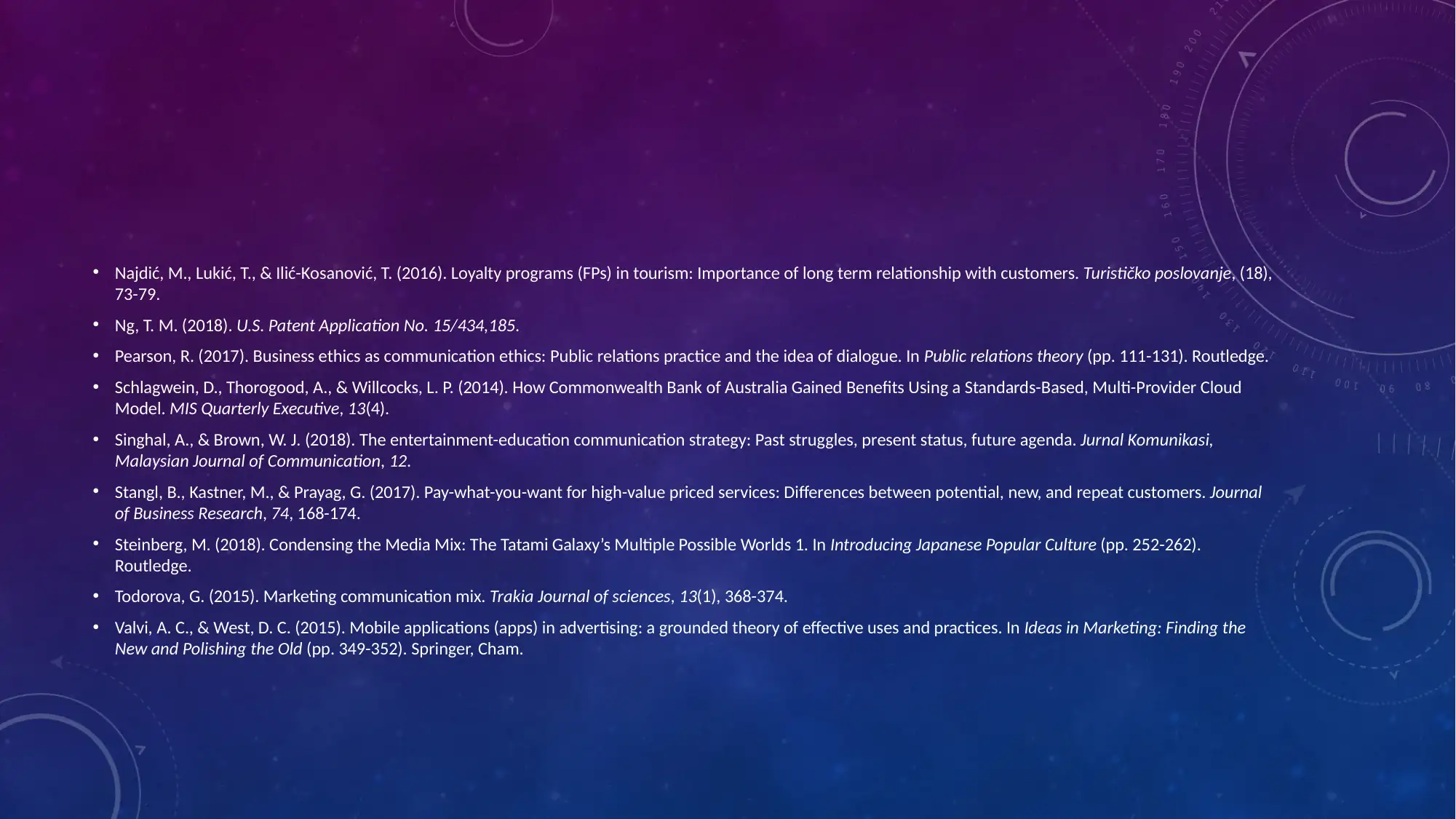
• Najdić, M., Lukić, T., & Ilić-Kosanović, T. (2016). Loyalty programs (FPs) in tourism: Importance of long term relationship with customers. Turističko poslovanje, (18),
73-79.
• Ng, T. M. (2018). U.S. Patent Application No. 15/434,185.
• Pearson, R. (2017). Business ethics as communication ethics: Public relations practice and the idea of dialogue. In Public relations theory (pp. 111-131). Routledge.
• Schlagwein, D., Thorogood, A., & Willcocks, L. P. (2014). How Commonwealth Bank of Australia Gained Benefits Using a Standards-Based, Multi-Provider Cloud
Model. MIS Quarterly Executive, 13(4).
• Singhal, A., & Brown, W. J. (2018). The entertainment-education communication strategy: Past struggles, present status, future agenda. Jurnal Komunikasi,
Malaysian Journal of Communication, 12.
• Stangl, B., Kastner, M., & Prayag, G. (2017). Pay-what-you-want for high-value priced services: Differences between potential, new, and repeat customers. Journal
of Business Research, 74, 168-174.
• Steinberg, M. (2018). Condensing the Media Mix: The Tatami Galaxy’s Multiple Possible Worlds 1. In Introducing Japanese Popular Culture (pp. 252-262).
Routledge.
• Todorova, G. (2015). Marketing communication mix. Trakia Journal of sciences, 13(1), 368-374.
• Valvi, A. C., & West, D. C. (2015). Mobile applications (apps) in advertising: a grounded theory of effective uses and practices. In Ideas in Marketing: Finding the
New and Polishing the Old (pp. 349-352). Springer, Cham.
73-79.
• Ng, T. M. (2018). U.S. Patent Application No. 15/434,185.
• Pearson, R. (2017). Business ethics as communication ethics: Public relations practice and the idea of dialogue. In Public relations theory (pp. 111-131). Routledge.
• Schlagwein, D., Thorogood, A., & Willcocks, L. P. (2014). How Commonwealth Bank of Australia Gained Benefits Using a Standards-Based, Multi-Provider Cloud
Model. MIS Quarterly Executive, 13(4).
• Singhal, A., & Brown, W. J. (2018). The entertainment-education communication strategy: Past struggles, present status, future agenda. Jurnal Komunikasi,
Malaysian Journal of Communication, 12.
• Stangl, B., Kastner, M., & Prayag, G. (2017). Pay-what-you-want for high-value priced services: Differences between potential, new, and repeat customers. Journal
of Business Research, 74, 168-174.
• Steinberg, M. (2018). Condensing the Media Mix: The Tatami Galaxy’s Multiple Possible Worlds 1. In Introducing Japanese Popular Culture (pp. 252-262).
Routledge.
• Todorova, G. (2015). Marketing communication mix. Trakia Journal of sciences, 13(1), 368-374.
• Valvi, A. C., & West, D. C. (2015). Mobile applications (apps) in advertising: a grounded theory of effective uses and practices. In Ideas in Marketing: Finding the
New and Polishing the Old (pp. 349-352). Springer, Cham.
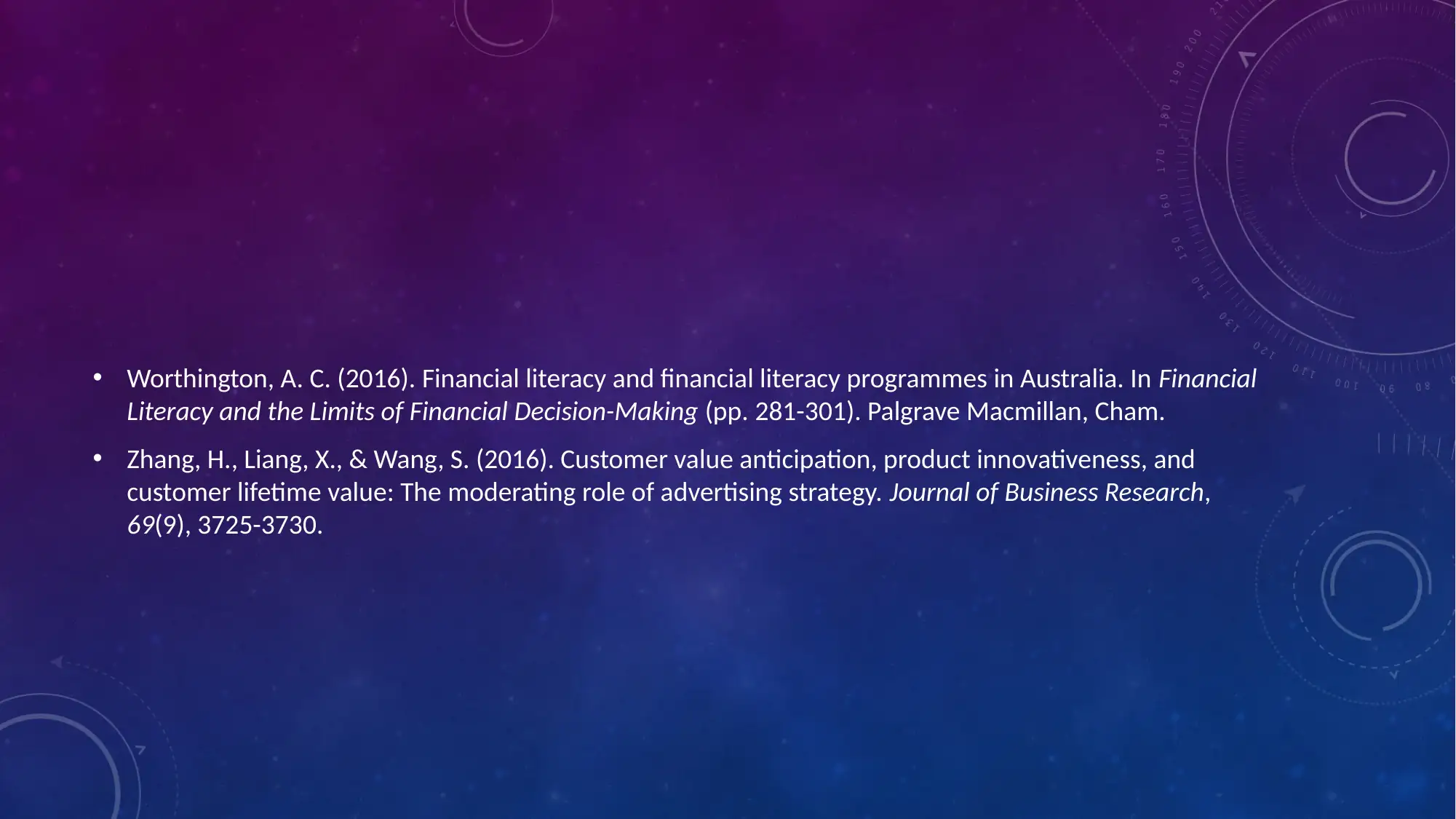
• Worthington, A. C. (2016). Financial literacy and financial literacy programmes in Australia. In Financial
Literacy and the Limits of Financial Decision-Making (pp. 281-301). Palgrave Macmillan, Cham.
• Zhang, H., Liang, X., & Wang, S. (2016). Customer value anticipation, product innovativeness, and
customer lifetime value: The moderating role of advertising strategy. Journal of Business Research,
69(9), 3725-3730.
Literacy and the Limits of Financial Decision-Making (pp. 281-301). Palgrave Macmillan, Cham.
• Zhang, H., Liang, X., & Wang, S. (2016). Customer value anticipation, product innovativeness, and
customer lifetime value: The moderating role of advertising strategy. Journal of Business Research,
69(9), 3725-3730.
⊘ This is a preview!⊘
Do you want full access?
Subscribe today to unlock all pages.

Trusted by 1+ million students worldwide
1 out of 13
Related Documents
Your All-in-One AI-Powered Toolkit for Academic Success.
+13062052269
info@desklib.com
Available 24*7 on WhatsApp / Email
![[object Object]](/_next/static/media/star-bottom.7253800d.svg)
Unlock your academic potential
Copyright © 2020–2026 A2Z Services. All Rights Reserved. Developed and managed by ZUCOL.




